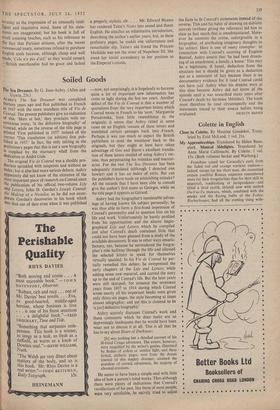Soiled Goods
Avaity's The Sea Dreamer was completed thirteen years ago and first published in French In 1947 with the more mundane title of Vie de Conrad. The present publishers give no indication of this. 'Here at last,' they proclaim with un- conscious irony, 'is the definitive biography' of Conrad, while on the reverse of the title page is Printed 'First published in 1957' instead of the e.orrect 'This translation (or edition) first pub- lished in 1957.' In fact, the only inkling in the Preliminary pages that this is not a new biography Is supplied by the mortuary whiff from the dedication to Andre Gide.
The original Vie de Conrad was a shoddy pro- duction sprinkled with misprints and without an Index; but it also had more serious defects. Aubry apparently did not know of the existence of the niost important piece of research on Conrad since the publication of his official two-volume Life and Letters, John D. Gordan's Joseph Conrad: tile Making of a Novelist, as he did not incor- Porate Gordan's discoveries in his book which Was thus out of date even when it was published —now, not surprisingly, it is hopelessly so because quite a lot of important new information has come to light during the last ten years. Another defect of the Vie de Conrad is that a number of quotations from the very important letters which Conrad wrote in French to his 'aunt,' Marguerite Poradowska, bore little resemblance to the originals; it seems that Aubry relied in some cases on an English version of these letters and translated certain passages back into French. Perhaps it was too much to expect the British publishers to send the translator back to the originals, but they might at least have taken advantage of Gee and Sturm's excellent transla- tion of these letters instead of using Aubry's ver- sion, thus perpetuating his mistakes and inaccur- acies. For the rest The Sea Dreamer has been adequately translated (although I detected one howler) and it has an index of sorts. But can the publishers have made an astonishing mistake? All the records that I have been able to consult give the author's first name as Georges, while on the title page it appears as Gerard.
Aubry had the biographer's inestimable advan- tage of having known his subject personally; he was thus able to form a first-hand impression of Conrad's personality and to question him on his life and work. Unfortunately he barely profited from his opportunities and the almost hagio- graphical Life and Letters which he compiled just after Conrad's death contained little that could not have been gleaned from a study of the available documents. It was in other ways unsatis- factory, too, because he surrendered the biogra- pher's role halfway through the life and allowed the selected letters to speak for themselves virtually unaided. In his Vie de Conrad he par- tially remedied this defect; he compressed the early chapters of the Life and Letters, while adding some new material, and carried the story up to the end of Conrad's life. But the later years were still skimped; for instance the seventeen years from 1897 to 1914 during which Conrad wrote nearly all his important books were given only thirty-six pages, the style becoming at times almost telegraphic; and yet this is claimed to be 'a [sic] definitive biography.'
Aubry scarcely discusses Conrad's work and those comments which he does make are so depressingly inadequate that he would have been wiser not to discuss it at all. This is all that he has to say about Heart of Darkness:
[It] was nothing but a detailed account of his ill-fated Congo adventure. The events, however, were magnified by the writer's genius, illumined by flashes of ardent or sombre light, and these lyrical, pathetic pages, torn from the dream journal of this mighty dreamer, attained the grandeur of eternal adventures, the majesty of classical creations.
He seems to have been a simple soul with little idea of how a person's mind works. Thus although there were plenty of indications that Conrad's recollections of his past, like those of most people, were very unreliable, he naively tried to adjust the facts to fit Conrad's statements instead of the reverse. This and his habit of drawing on dubious sources (without giving the reference) led him to state as fact much that is unsubstantiated. More- over he commits the crime, unforgivable in a biographer, of attributing imaginary thoughts to his subject. Here is one of many examples : in connection with Conrad's courting of Eugenie Renouf, Aubry asserts that 'he had been dream- ing of an attachment, a family, a home.' This may be a legitimate, if banal, deduction from the situation but it should be given as a deduction not as a statement of fact because there is no documentary evidence for it (and Conrad could not have told Aubry what his dreams were at this time because Aubry did not know of the episode until it was unearthed many years after Conrad's death by Savinien Meredac). The book must therefore be read circumspectly and the statements traced to their source before being






























 Previous page
Previous page